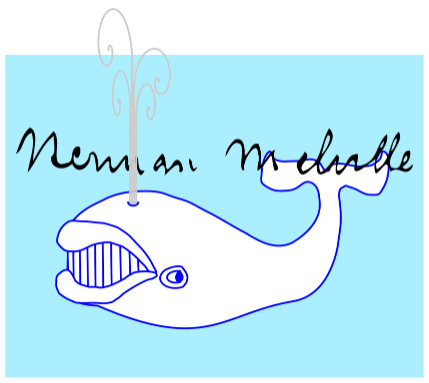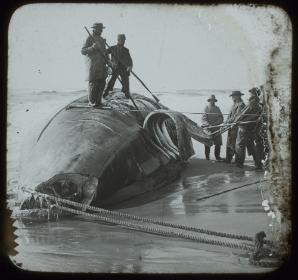Today in History: Moby Dick Is Published

Consider the subtleness of the sea; how its most dreaded creatures glide under water, unapparent for the most part, and treacherously hidden beneath the loveliest tints of azure. Consider also the devilish brilliance and beauty of many of its most remorseless tribes, as the dainty embellished shape of many species of sharks. Consider, once more, the universal cannibalism of the sea; all whose creatures prey upon each other, carrying on eternal war since the world began.
Consider all this; and then turn to the green, gentle, and most docile earth; consider them both, the sea and the land; and do you not find a strange analogy to something in yourself? For as this appalling ocean surrounds the verdant land, so in the soul of man there lies one insular Tahiti, full of peace and joy, but encompassed by all the horrors of the half-known life. God keep thee! Push not off from that isle, thou canst never return!
--Moby Dick, Ch. LVII, "Brit", p.219
On October 18, 1851, Moby-Dick, or The Whale, a novel by American writer Herman Melville, was published by Richard Bentley in London, England, preceding the Harper and Row American edition on November 14th, 1851. The book, met with mixed reviews and scanty sales, told the tragic story of Captain Ahab and his revenge on a great white sperm whale who destroyed half of his leg. Narrated by the sailor Ishmael, the epic follows the crew's three year journey aboard the whaling ship Pequod, from the Atlantic to the Indian to the South Pacific oceans. Setting sail on Christmas Day from Nantucket, the ship was believed to have been named after the Algonquian-speaking Pequot tribe of Native Americans, while Moby Dick, the leviathan, has been interpreted to symbolize God, nature, good, evil, the ocean, power, and more.
Melville was inspired by true story of the whaler Essex, an 87-foot long ship which left Nantucket in 1819, and was attacked and sunk by a whale, cutting short its two and a half year voyage. "Mocha Dick" was a large, powerful, and much-feared albino male sperm whale who lived off the coast of Chile in the early nineteenth century. Melville's work, dedicated to American novelist and short story writer Nathaniel Hawthorne, eventually became a classic in American literature -- and a recognized literary masterpiece throughout the world. Despite its length (135 chapters), Moby Dick, a great American novel, is still read in schools today, with exploration of genre, historical context, and our universal human condition.
In 1987 the whaling industry became illegal in most countries, and the sale of sperm oil prohibited. It was outlawed in the United States in 1971. Whales became an endangered species, as other sources of oil, including kerosene, petroleum, and fossil fuels proved more reliable subsitutes. Meat, skin, blubber, organs, or bones could not be eaten or used in a multitude of products that included fishing lines, baskets, roofing, and tools.

The following articles are drawn from Proquest Historical Newspapers, which informs and inspires classroom teaching and learning.
- Unknown Writings of Moby Dick's Biographer: Some Personal Letters of Herman Melville, and a Bibliography. (1923, Jan 21). New York Times (1923-)
- Gorman, H. G. (1929, Mar 10). That Strange Genius, Melville: Lewis Mumford Writes a Notable Study of Moby Dick's Creator Herman Melville. New York Times (1923-)
- Rare Melville Book Is Bid in at $1,575: English Forerunner of 'Moby Dicks' Brings Berst Price at Sale of Portland Collection. (1935, Oct 17). New York Times (1923-)
- First Appearance of 'Moby-Dick'. (1956, Nov 07). The Christian Science Monitor (1908-)
- Books for the Ages: Herman Melville's Moby Dick. (1968, Dec 06). Chicago Tribune (1963-1996)
- Kenny, H. (1976, Oct 24). 'Moby Dick'--125 Years Later: Acclaim Came Too Late for Herman Melville to Know His Strange Novel of the Sea Was to Be Considered an American Masterpiece. Boston Globe (1960-)
- Arnter, A.G. (1996, Jan 28). Pursuing 'Moby-Dick': Artists Seek Visual Forms for the Classic Novel's Powerful Mysteries. Chicago Tribune (1963-1996) R
- Pritchard, W. H. (1996, Nov 22). Prelude to a Aasterpiece: Bookshelf. Wall Street Journal (1923-)
- Teicher, S.A. (2001, Jul 31). When School's Out-- Teachers Are In: Walking Through Melville's Diverse World. The Christian Science Monitor (1908-)
- Craig, P. (2006, Jan 28). Whale of a Story: Herman Melville, the Elusive Author of 'Moby-Dick', Is Well Served by Andrew Delbanco. The Irish Times (1921-)

Tips:
- Bryant, John, Mary K. Bercaw Edwards, and Timothy Marr, eds. Ungraspable Phantom : Essays on Moby-Dick. Kent, Ohio: The Kent State University Press, 2006. e-book
- Cook, Jonathan A. (Jonathan Alexander). Inscrutable Malice : Theodicy, Eschatology, and the Biblical Sources of Moby-Dick. DeKalb, Illinois: NIU Press, 2012. e-book
- Dowling, David Oakey. Chasing the White Whale the Moby-Dick Marathon ; or, What Melville Means Today. Iowa City: University of Iowa Press, 2010. e-book
- King, Gilbert. The True Life Horror That Inspired Moby Dick. The Smithsonian Magazine, March 1, 2013.
- Melville, Herman. Moby Dick; or, The White Whale. No place, unknown, or undetermined: The Spencer Press, [19__], 1900. e-book
Images:
- Herman Melville Signature Moby Dick, by Eugenio Hansen, Wikimedia Commons
- Skinning Whale to Get at Blubber, Long Island beach, N.Y., from the Rothman Lantern Slide Collection, Courtesy of Teachers College, Columbia University
- Special News Slide, Courtesy of Gottesman Libraries
Need to keep current, look to the past, teach a topic? The Everett Cafe features daily postings of news from around the world, and also promotes awareness of historical events from an educational context. Be sure to check additional Cafe News postings on the library blog.

